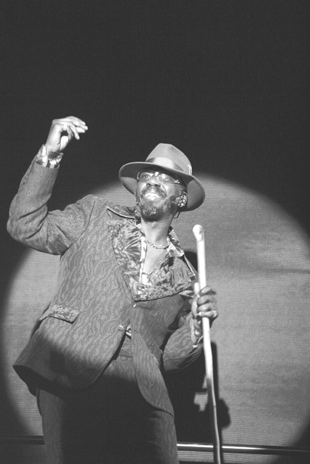By Steven Snyder
Some plays strike that elusive spark with an audience, sending a current of electricity pulsing through the theater. Will Power’s “The Seven” is a lightning storm of energy and inventiveness, a wholly unique experiment of reinterpretation that leaves some audience members cheering, others befuddled, but all whipped silly by a theatrical experience flipped upside down.
Best known for “Flow,” which won acclaim at the 2003 New York City Hip-Hop Festival, Power is a wizard of both physical and verbal dexterity, eagerly and fearlessly integrating the movement, rhythm and vernacular of hip-hop into larger theatrical formulas. In “The Seven,” he moves beyond “Flow” to tackle two more rigorous challenges: musical theater and Greek tragedy.
“The Seven” is loosely based upon Aeschylus’ “Seven Against Thebes,” which is the tale of Thebes, a city under siege, and the sons of the disgraced Oedipus: Eteocles and Polynices. But “The Seven” is far from a strict revival and, as molded by writer and composer Power and director Jo Bonney, the musical borrows heavily from other famous tragedies and cultures, both old and modern. Unlike “Thebes,” Oedipus himself plays a prominent role, partly so that Power can depict hatred spreading down through the generations and partly to allow Edwin Lee Gibson a chance to strut his stuff in an unforgettable, show-stopping performance. Also included in the program is a hilarious “Greek/hip-hop glossary” that lists definitions of “Troy” and “The Sphinx” alongside words and phrases coined centuries later, including “crunk,” “Mack Daddy” and “wanksta.”
This is the stuff of Greek mythology all right, but mixed up and scratched out, and given a back beat that recasts these ancient curses and conflicts in a modern form. The narrator is also a DJ, and she mixes up the records much as a playwright mixes a story. Above her, on a raised portion of the set is Oedipus, the angry, sneering, cursed soul who dons a cane, a leather coat and a pair of shades as he screams from the rafters and passes his curse down to his sons.
Eteocles (Manuel Herrera) and Polynices (Jamyl Dobson), however, are determined to break their father’s curse, which says they will one day kill each other, and they form a plan to separate and take turns ruling their kingdom one year at a time. Eteocles starts his reign with the help of his “Right Hand” (Tom Nelis), a suit-wearing prototypical politician. Polynices, meanwhile, heads off to live a year in the woods alongside Tydeus (Flaco Navaja) who not-so-subtly falls in love with the would-be king.
But the more Oedipus pokes and prods his sons, the more they forget about the curse and their plan to thwart it. Polynices returns, demanding his turn as king, and Eteocles refuses, assembling his army.
This tale of destiny, however, plays second fiddle to the play’s form, and Power always remains one step ahead of our expectations. Here, he gleefully jumps through every shade of hip-hop — from tunes that are catchy to those that meditate and incite — and then slyly shifts his focus away from the mechanics of an ancient melodrama to the sub plot most resonant today: The arrogance of two blessed, spoiled leaders who readily spill the blood of their followers to settle personal grudges.
In a flash, Thebes doesn’t seem like such an ancient place.
Some will wonder why Power has drifted away from original stories to approach this material. But this impeccable production, from David Weiner’s evolving lighting design that embraces everything from disco balls to towering, overwhelming shadows, to Richard Hoover’s layered set design that allows these characters room to breathe, dance, crawl and jump, shows how the old can be made new again, and how even classical theater can be recast as an immediate and vital experience.
Everywhere you look, the show is reaching out to draw you in. In the place of mournful soliloquies are a series of angry and creative hip-hop melodies, songs that sample everything from the improvisational style of “Stomp” to the roof-raising energy of James Brown. In the place of classical prose is a game of modern references and wordplay, littered with phrases such as “hella guards,” “player haters” “Original O.D.B.,” “Mulder and Scully,” and “Punk’d.”
Productions like “The Seven” and playwrights like Power prove that his brand of theater —an experience that spins together hip-hop and Sophocles just as easily as it brings together a crowd of old white theater buffs and young black hip-hop fans, bouncing in their seats — is one of the ways this often-sanitized art form will remain fresh, particularly for a new generation.





































